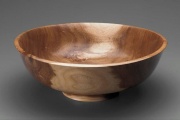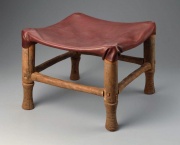Difference between revisions of "Acacia"
(username removed) |
(username removed) |
||
| Line 2: | Line 2: | ||
== Description == | == Description == | ||
| − | Evergreen trees and shrubs of the species of ''Acacia'' of the Leguminosae family. The trees are widely distributed through India, Hawaii, and Australia. Several commercial products are produced by these trees. [http://cameo.mfa.org/materials/fullrecord.asp?name=Gum | + | Evergreen trees and shrubs of the species of ''Acacia'' of the Leguminosae family. The trees are widely distributed through India, Hawaii, and Australia. Several commercial products are produced by these trees. [http://cameo.mfa.org/materials/fullrecord.asp?name=Gum%20arabic Gum arabic] is produced from the sap and pods of ''Acacia arabic'' and ''Acacia senegal''. Kordofan gum comes from ''Acacia verek'' and is used in jellies, candies, and other food products. [http://cameo.mfa.org/materials/fullrecord.asp?name=Cutch%20%28dye%29 Cutch] is a brown or black dye obtained from ''Acacia catechu''. [http://cameo.mfa.org/materials/fullrecord.asp?name=Wattle%20bark Wattle bark] produces a strongly astringent tannin from ''Acacia mimosa'' and ''Acacia mollisima'' trees. Strong, coarse bast fibers obtained from the ''Acacia leucophloea'' trees are used for ropes and nets. Some acacias are used for timber such as the ''Acacia melanoxylon'' (Australian blackwood), ''Acacia formosa'' (sabicu), Acacia seyal (shittah tree), and the ''Acacia koa'' (koa). The strong, elastic, hardwood is used for furniture, walking sticks, and tool handles. |
[[File:72.4265-CR3662-d1.jpg|thumb|]] | [[File:72.4265-CR3662-d1.jpg|thumb|]] | ||
== Synonyms and Related Terms == | == Synonyms and Related Terms == | ||
| − | Acacia melanoxylon (Australian blackwood); Borneo cutch; Acacia arabic; ''Acacia senegal; Acacia verek;'' Acacia catechu; Acacia mimosa; Acacia mollisima; Acacia leucophloea; Acacia koa; Acacia formosa (sabicu); Acacia seyal (shittim wood); Akacie (Dan.); Akazien (Deut.); acacia (Esp., Fr., It.. Ned.); Akacja (Pol.); | + | Acacia melanoxylon (Australian blackwood); Borneo cutch; Acacia arabic; ''Acacia senegal; Acacia verek;'' Acacia catechu; Acacia mimosa; Acacia mollisima; Acacia leucophloea; Acacia koa; Acacia formosa (sabicu); Acacia seyal (shittim wood); Akacie (Dan.); Akazien (Deut.); acacia (Esp., Fr., It.. Ned.); Akacja (Pol.); acácia (Port.) |
== Additional Images == | == Additional Images == | ||
| Line 19: | Line 19: | ||
== Authority == | == Authority == | ||
| − | * | + | * F. H. Titmuss, ''Commercial Timbers of the World'', The Technical Press Ltd., London, 1965 |
| − | * | + | * G.S.Brady, ''Materials Handbook'', McGraw-Hill Book Co., New York, 1971 Comment: p. 462 |
| − | * | + | * Random House, ''Webster's Encyclopedic Unabridged Dictionary of the English Language'', Grammercy Book, New York, 1997 |
* ''The American Heritage Dictionary'' or ''Encarta'', via Microsoft Bookshelf 98, Microsoft Corp., 1998 | * ''The American Heritage Dictionary'' or ''Encarta'', via Microsoft Bookshelf 98, Microsoft Corp., 1998 | ||
| − | * | + | * Matt Roberts, Don Etherington, ''Bookbinding and the Conservation of Books: a Dictionary of Descriptive Terminology'', U.S. Government Printing Office, Washington DC, 1982 |
* ''Fairchild's Dictionary of Textiles'', Phyllis G.Tortora, Robert S. Merkel (eds.), Fairchild Publications, New York City, 7th edition, 1996 | * ''Fairchild's Dictionary of Textiles'', Phyllis G.Tortora, Robert S. Merkel (eds.), Fairchild Publications, New York City, 7th edition, 1996 | ||
Revision as of 07:24, 24 July 2013
Description
Evergreen trees and shrubs of the species of Acacia of the Leguminosae family. The trees are widely distributed through India, Hawaii, and Australia. Several commercial products are produced by these trees. Gum arabic is produced from the sap and pods of Acacia arabic and Acacia senegal. Kordofan gum comes from Acacia verek and is used in jellies, candies, and other food products. Cutch is a brown or black dye obtained from Acacia catechu. Wattle bark produces a strongly astringent tannin from Acacia mimosa and Acacia mollisima trees. Strong, coarse bast fibers obtained from the Acacia leucophloea trees are used for ropes and nets. Some acacias are used for timber such as the Acacia melanoxylon (Australian blackwood), Acacia formosa (sabicu), Acacia seyal (shittah tree), and the Acacia koa (koa). The strong, elastic, hardwood is used for furniture, walking sticks, and tool handles.
Synonyms and Related Terms
Acacia melanoxylon (Australian blackwood); Borneo cutch; Acacia arabic; Acacia senegal; Acacia verek; Acacia catechu; Acacia mimosa; Acacia mollisima; Acacia leucophloea; Acacia koa; Acacia formosa (sabicu); Acacia seyal (shittim wood); Akacie (Dan.); Akazien (Deut.); acacia (Esp., Fr., It.. Ned.); Akacja (Pol.); acácia (Port.)
Additional Images
Authority
- F. H. Titmuss, Commercial Timbers of the World, The Technical Press Ltd., London, 1965
- G.S.Brady, Materials Handbook, McGraw-Hill Book Co., New York, 1971 Comment: p. 462
- Random House, Webster's Encyclopedic Unabridged Dictionary of the English Language, Grammercy Book, New York, 1997
- The American Heritage Dictionary or Encarta, via Microsoft Bookshelf 98, Microsoft Corp., 1998
- Matt Roberts, Don Etherington, Bookbinding and the Conservation of Books: a Dictionary of Descriptive Terminology, U.S. Government Printing Office, Washington DC, 1982
- Fairchild's Dictionary of Textiles, Phyllis G.Tortora, Robert S. Merkel (eds.), Fairchild Publications, New York City, 7th edition, 1996
- Wikipedia, the free encyclopedia, at http://www.wikipedia.com Comment: http://en.wikipedia.org/wiki/Acacia (Dec. 30, 2005)



